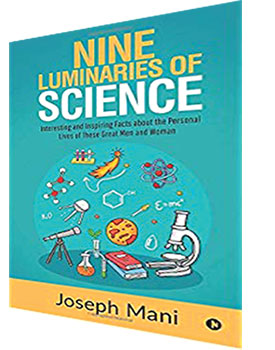Nine Luminaries of Science – Joseph Mani
Notion Press, Rs.200, Pages 188
 There’s fascinating history in all men’s lives. One can draw valuable lessons even from histories of unremarkable and ordinary people. But it has to be accepted that reading about the lives and accomplishments of people who have made outstanding contributions in the cause of bettering the human condition is always a greater joy and inspiration.
There’s fascinating history in all men’s lives. One can draw valuable lessons even from histories of unremarkable and ordinary people. But it has to be accepted that reading about the lives and accomplishments of people who have made outstanding contributions in the cause of bettering the human condition is always a greater joy and inspiration.
In this wonderful book, author Joseph Mani documents the personal lives of nine well-known men and women who played a major role in the development of modern science, and whose pioneering research and inventions have made significant contributions towards enhancing the human condition and making so-long life better for mankind.
The nine great luminaries the author profiles are Nicholaus Copernicus (b.1473), Galileo Galilei (1564), Isaac Newton (1642), Marie Curie (1867), Jagdish Chandra Bose (1858), Albert Einstein (1879), C.V. Raman (1888), Richard Feynman (1918) and Stephen Hawking (1942). Taken together, their lifespans cover some 500 years, marking the emergence and development of the era of modern science.
The author’s description of the lives of these nine scientists is not intended to be a detailed biographical account. Nor does it deal in depth with their various scientific works (which would perhaps require an entire book in every case). Rather, this compendium highlights the human side of these select great scientists. Undoubtedly they had their genius, but they also had their faults and, in some cases, idiosyncrasies, like most people do.
Condensing their life stories into one chapter for each, the book provides illuminating insights into the lesser-known facets of their personalities. We get to know the gentler and more human side of genius. We learn about their family backgrounds and life events, the great obstacles some of them had to surmount to realise their full potential, and their economic hardships and struggles. The reader also gets acquainted with their troubled marriages and tangled personal relationships.
Enlivening the narrative of Nine Luminaries are the eccentricities for which scientists are infamous and loved. For instance, did you know that Richard Feynman, acclaimed as one of the world’s greatest theoretical quantum mechanics physicists who was awarded the Nobel Prize in 1965, never brushed his teeth and also advised people on national television to avoid doing so? Or, that the late Stephen Hawking delighted in riding his wheelchair over the toes of people he disliked? The book also provides fascinating details about the religious beliefs (or atheism) of some of the world’s most well-known scientists.
An unexpected bonus of these sketch biographies is that they also reveal all the multiple factors that go into the making of eminent scientists. While innate academic brilliance is a vital factor, early childhood experiences, relationships at home, difficult economic conditions, personal encounters and even emotional challenges can have a powerful impact on individuals, leading them, in ways one would never have imagined, to rise to fame.
As an introduction to the fascinating lives of nine individuals and their influential contributions to modern science, this book excels. Written in an easy, relaxed style, it’s certain to resonate with teachers, parents and students. There is much information to be gleaned from these engaging accounts of the selected grey eminences of science about whom we know little, but may have benefited greatly from their scientific investigations and achievements.
That said, I have a complaint: we aren’t told about why the author chose these particular nine scientists to profile. And why nine, and not say, ten, the closest round-figure? And then again, why not scientists from other parts of the world and civilisations? Or from diverse religious and cultural backgrounds which would probably have added to the richness of this book. But perhaps that is something that Joseph Mani will deal with in another book!
Roshan Shah























